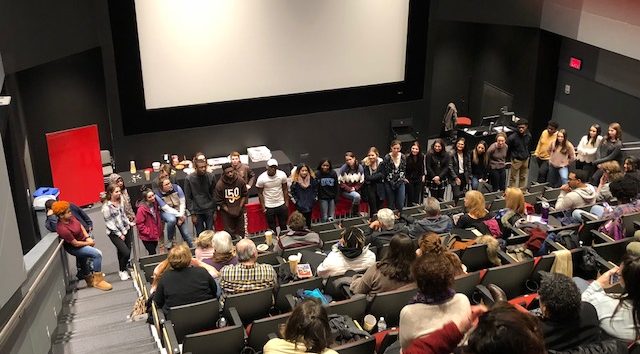Having never taken any filmmaking classes before, I was actually surprised to be asked to have something filmed, edited and ready to screen in two hours, however I quickly realized this was possible because I would be grouped with people who know how to tackle that. With that being said, the roles and abilities of my group members and myself were diverse. Shreya was assigned the group leader, and she did a great job of making sure we all stayed focused. The most important element to consider was what we could do with the time we had. As Margie set up the camera on the tripod, we worked simultaneously to speak our minds eliminating topics so we could quickly come to an agreement. Multitasking paid off here. This seemed to be a tactic that worked because once we moved passed that, we could begin to focus on the interviews.
Also, being new to film, I wanted to observe everything. I watched how to properly mount the camera on the tripod, and once we realized we needed a new battery I was able to assist in removing the camera so the battery could be changed. A small, but meaningful feat for me.
Shreya suggested using Prof. Smith’s office which ended up being a nice choice because of its various visual elements we could use as a background for the interview. It was visually appealing, but not over-stimulating to the eye, keeping the focus on the interviewee while adding a dimension of interest. Margie was a great group member to have because her personality is laid back, which was helpful when the group might have been feeling the tension of a rushed assignment. Her input in questioning was helpful too because she began to ask questions to the interviewee as if she were having a conversation with them without a camera. In relation to some of what I’ve read, this is a great skill to develop as a documentarian because it provides some lubrication in getting the storyteller to loosen up and be natural. I myself felt like I was acting which was a really uncomfortable experience. However, I am glad I did it because now I know how people feel who are being interviewed and what might help to alleviate that awkwardness. There was a hiccup in our sound recording during Regi’s interview, which was quickly realized by the time we got to the next interview. The downside was we had to do a retake of everything Regi said. I can imagine it being awkward to retell a story on camera. I could tell that his excitement in telling the story dwindled. People don’t like to repeat themselves under any context, and especially on camera. As we were packing up, it was established that Regi would edit the film, him being confident enough in himself that he could manage it, which he did amazingly. I appreciated his mild manner paired with his conviction. It made me optimistic in his abilities. I was excited to watch him use Premiere because I will be learning this software in another one of my classes this semester. I actually learned a lot from everyone and had a really fun time working with everyone. Our group was awesome.
I’d say some things I took note of in terms of areas for improvement would be trying make quicker decisions in all parts of the process (in this case, due to time), have more trust in the abilities of others, and take into consideration everyone’s strengths and weaknesses, perhaps using the weaknesses to your advantage through entertaining open lines of communication for learning opportunities amongst all group members.
The final product was a success. I was really impressed by Regi’s editing and relaxed confidence, Margie’s camera knowledge/organic prowess in interviewing, Shreya’s leadership/actively creative thought and thinking ahead/persistence (such as trying to get our title into the final product), and with myself for being inquisitive and jumping into the challenge knowing basically nothing.
The final pieces of the other groups were splendid and really inspiring in a way that makes me excited to be taking on this minor. The diversity amongst the groups with the same topic was very cool to see. I liked how some groups highlighted their interviewees with a very dry sense of humor by cutting immediately after some of their remarks. The camera angles in the DACA interview assisted in conveying to the audience that something serious and meaningful is being talked about. That group also had someone reading a definition from their phone which was a helpful touch because it implied a reliable source of information. The pet therapy film was well done. The jittery hands and feet added to the narrative and played comically into the stereotype of quirky, ’off-balance’ people who seek counseling. I was also impressed by the ‘Unifying Universities’(?) group for working smart, and hence effectively, under the pressure of creating a film after having lost it.
If this is the kind of work that can be done in two hours, then I can only imagine how well we all can work together in composing future projects. The learning opportunities ahead are irresistible.
